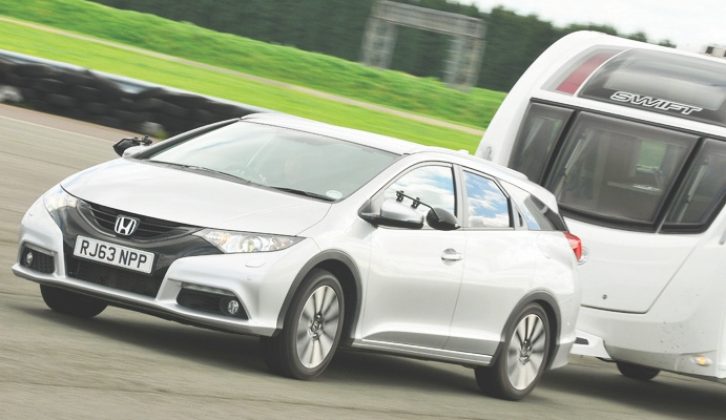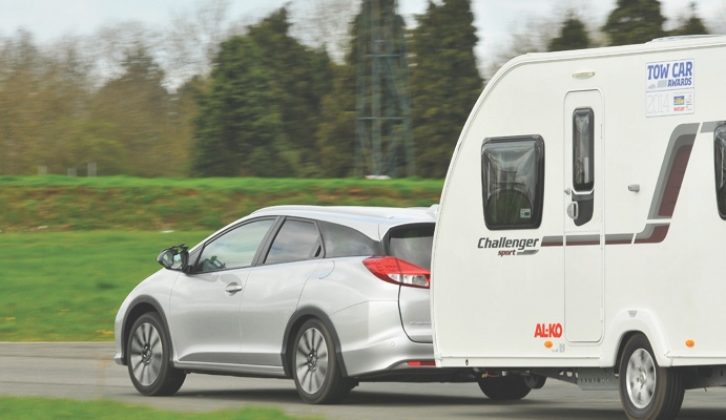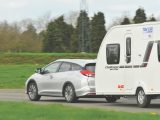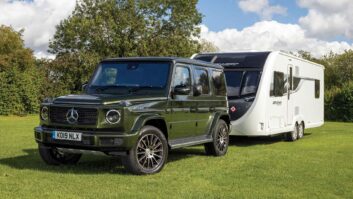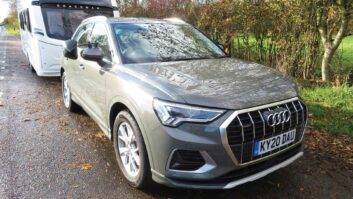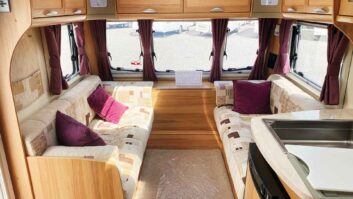SUVs rule the world these days. Every manufacturer worth its salt has to have one, or risk being wholly uncompetitive.
However, as popular as they might be, not everyone likes sitting up so high, and SUVs do bring other compromises, such as poorer fuel economy. That’s the main reason why there’s still a market (albeit quite small) for a hatchback-based estate car.
These are designed to get on with the unglamorous but oh-so-necessary job of being practical and unassuming.
Step forward the Honda Civic Tourer (2014-2017), based on the unusual-looking Civic hatchback, with more space and usability to boot, if you’ll pardon the pun.
The Civic on which this estate is based first appeared in 2012, but it took Honda a full two years to get the estate out to customers. However, the engineers did a good job.
The car was the same as the hatch from front bumper to rear doors, but elsewhere, all new. The extra 235mm meant useful additional luggage space over the hatch, while the more horizontal roofline paid off in terms of rear-seat headroom.
There were only two engines offered, a 1.8-litre petrol and a 1.6-litre turbodiesel, with the latter being far better suited for those who want to tow.
Model history
The car we focus on here wasn’t the first-ever Civic estate, but it was the most…. estatey.
Where the sixth-generation Civic Aerodeck was more of a then-trendy ‘lifestyle’ estate, this vehicle really has everyday practicality at its core.
It’s a car that suits business drivers who need to carry a lot of stuff during the working week, then want to take fun stuff into the countryside at weekends. Or go to the tip.
For a start, the boot is large, at 624 litres with the rear seats in place (including the storage area beneath the removable floor), and an echoing 1668 litres with them folded flat. It feels almost big enough for a game of five-a-side.
Better still, when you fold down those rear seats (using a lever at each end of the seat), the resulting floorspace is entirely flat, so you won’t face awkward snags when trying to slide in large or heavy items.
However, bear in mind that, as easy as the folding process is, more modern rivals will allow you to do this using levers sited near the tailgate.
The Civic’s practicality is also enhanced by the presence of Honda’s ‘magic’ rear seats. These have cushions that can be flipped up vertically, which makes it much easier to carry awkwardly shaped loads.
Space in the rear seats is reasonable, and those up front get plenty of room.
As mentioned, two engines were available, but tow car buyers would be best to skip the petrol, which needs to be revved if it’s to make progress. This can have a somewhat detrimental effect on the car’s fuel economy. It’s worse still with the optional automatic gearbox fitted.
Diesel is undeniably the way to go: not only does the 1.6-litre unit develop a reasonable 118bhp and a gutsy 22lb ft of torque, but it also has a claimed average economy figure of 74.3mpg.
As a tow car, the Civic Tourer does have some weakness. When we tested it for the 2014 Tow Car Awards, we found that it could be moved around by the trailer in the lane-change test, and steep hill starts caused the clutch to emit a decidedly pungent odour, signifying the car wasn’t altogether thrilled. We’d advise that you load everything carefully and don’t make the trailer too heavy.
The Civic solo driving experience is unexciting: so it will get you where you want to be, but you’re unlikely to recall much about the trip.
Whichever trim level you choose, it’ll provide plenty of kit. Even the entry-level models have Bluetooth, DAB radio, USB connectivity and alloy wheels. Higher-spec models have rear parking sensors, adaptive rear suspension, heated seats, larger alloys and even a rear parking camera, which is great when you’re manoeuvring about before hitching up.
However, the car’s dashboard is a heavily stylised and rather complicated affair, which won’t be to everyone’s taste.
Trouble spots
This is a Honda, so reliability is pretty much a given.
The car has been subject to two recalls. The first concerned the stability control system and its relationship with the anti-lock brakes. The second was because the ABS could sometimes allow a wheel to lock during emergency braking.
Apart from that, there have been no problems with the Civic Tourer; so buying one should simply be a case of making sure that the car you’re looking at has been cared for properly, and is showing no signs of abuse.
Verdict
The Honda Civic Estate diesel makes for a spacious, practical, well-equipped car that’s easy to live with and will cost comparatively little to run. There’s also more chance of night not following day than there is of something going wrong with it.
However, this isn’t the most exciting car, and that dashboard can be infuriatingly complex. The Civic can also be affected when hitched to a trailer.
Still, the right car will be one that does all you need without making an impression (good or bad) – and it isn’t an SUV.
Honda Civic Tourer – need to know
How much? £5000-£11,500
Even the oldest Civic Tourers are only four years old, but you can still grab them for the relatively bargain price of £7000. These will be higher-mileage examples, but they will have spent the bulk of their lives on the motorway. As ever, condition is more important than mileage.
If you can raise your budget to £11,000, that will net you a 2015-onwards car with fewer than 40,000 miles on the clock. There’s little need to spend more than that, because all you’ll be doing is paying for extra kit that you’re pretty unlikely to need anyway.
What will it tow?
- Kerbweight……..1662kg
- 85% match……..1360kg
- Towing limit……..1400kg
- Noseweight limit….75kg
How much is a towball?
- Witter flange towbar: £158.22
- Witter detachable towbar: £264.40
Fitting extra (from PF Jones)
What about servicing?
- Interim service: £204.25
- Full service: £281.37
(Prices from Servicing Stop)
Best for towing: 1.6 i-DTEC SE Plus
This is the stronger and more economical of the engines. SE Plus trim brings front and rear parking sensors, reversing camera, automatic lights and other extras.
Worst for towing: 1.8 EX Plus automatic
A perkier solo drive, but it doesn’t have the torque to cope with a trailer, and the auto gearbox only hampers its progress even more.
The Civic's practicality is also enhanced by the presence of Honda's 'magic' rear seats. These have cushions that can be flipped up vertically, which makes it much easier to carry awkwardly shaped loads.
